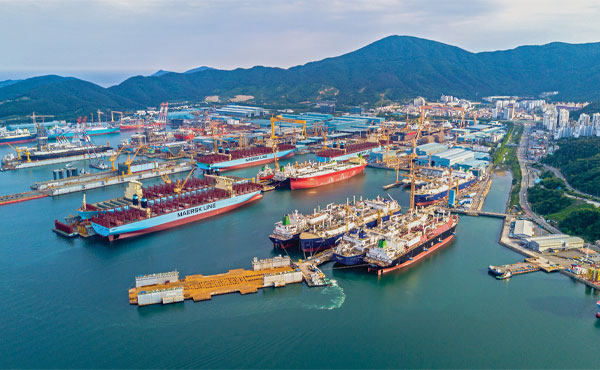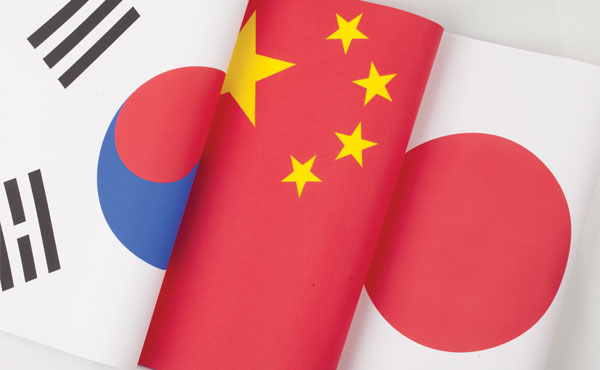in Issue & Trend
Korean Issue Highlights
Korean Issues Timeline

Korean Issues Timeline
January
1st
2024 Exports Reach Record High of $683.8 Billion
South Korea’s exports in 2024 hit an all-time high of $683.8 billion, marking an 8.2% increase from the previous year. Semiconductors, the country’s leading export item, surged 43.9% to $141.9 billion, accounting for approximately 20% of total exports. Automobile exports exceeded $70 billion for the second consecutive year, totaling $70.8 billion, while ship exports rose 18% to $25.6 billion. By region, exports to China increased by 6.6% to $133 billion, and exports to the US jumped 10.5% to $127.8 billion—both setting new records. The overall trade surplus stood at $51.8 billion, marking South Korea’s first annual surplus in three years.
10th
Trump’s Call for Cooperation Raises Expectations for K-Shipbuilding
With the upcoming launch of Donald Trump’s second administration, Korea’s shipbuilding industry is seeing growing expectations for potential benefits from expanded cooperation with the US. In response to China’s naval buildup, the US is moving to strengthen shipbuilding alliances and has expressed willingness to collaborate with Korea in ship maintenance, repair, and overhaul (MRO), positioning Korea as a key partner. Hanwha Ocean, in particular, has secured a foothold by acquiring a US shipyard, and Trump’s pledge to lift LNG export restrictions has sparked speculation about a rise in LNG carrier orders.

22nd
Stricter Listing Standards Aim to Weed Out Underperforming Firms
In a bid to resolve the “Korea discount,” financial authorities are pushing for sweeping reforms to tighten listing maintenance standards and streamline delisting procedures. Market cap and revenue thresholds will be raised by up to tenfold, and by 2029, approximately 200 companies are expected to be delisted from the KOSPI and KOSDAQ. To accelerate the removal of suspended companies, the government will shorten delisting review procedures and improvement periods. In addition, during IPOs, the proportion of shares subject to mandatory holding commitments by institutional investors will increase from 20% to 40% to curb speculative profit-taking and early withdrawals.

28th
Seoul Welcomes Over 12 Million Foreign Tourists
The Seoul Metropolitan Government announced that the number of foreign tourists visiting the city reached 12.12 million from January to November last year, recovering to 95% of pre-COVID-19 levels (compared to 2019). Seoul was named “Best MICE City” for the 10th consecutive year by Global Traveler. The city also hosted Asia’s 50 Best Restaurants for the first time in Korea and unveiled its new nighttime tourism landmark, “Seoul Dal.” In 2025, the city plans to further boost tourism with events such as Seoul Festa, the Han River Festival Series, the BBQ Festival, and unique campaigns like “Seoul Edition 25” and “Seoul Spot.”

February
2nd
Korea’s Per Capita GDP Reaches $36,000 Range
South Korea’s per capita GDP in 2024 is estimated to have increased by 1.28% year-on-year to $36,024, surpassing Japan and Taiwan based on IMF standards. This growth reflects a 5.9% increase in nominal GDP and slower population growth, with improved terms of trade and rising prices acting as positive factors. However, the rising KRW-USD exchange rate offset some of the gains. If economic momentum continues, per capita GDP is expected to exceed $37,000 this year.
6th
Fitch Affirms South Korea’s Credit Rating at AA-
On February 6, international credit rating agency Fitch reaffirmed South Korea’s credit rating at AA- with a stable outlook. Despite ongoing political uncertainty, Fitch positively assessed Korea’s robust external fundamentals, macroeconomic stability, and export competitiveness. However, it warned that prolonged political gridlock could undermine policy effectiveness and fiscal soundness, potentially triggering a downgrade. Fitch revised Korea’s 2025 economic growth forecast downward to 1.7%. The government pledged to strengthen communication with global rating agencies and actively manage Korea’s external creditworthiness.
25th
Bank of Korea Cuts Base Rate by 0.25%
On February 25, the Bank of Korea’s Monetary Policy Board cut the benchmark interest rate by 0.25 percentage points from 3.00% to 2.75%, continuing its accommodative monetary stance. This marks the third rate cut since October 2023, reflecting slowing growth, weak domestic demand, and political uncertainty. The central bank revised its 2025 growth forecast down from 1.9% to 1.5%, while maintaining its 2026 outlook at 1.8%. Inflation is projected to remain steady at 1.9% for both 2025 and 2026.
26th
Birthrate Rebounds for First Time in 9 Years, but Challenges Remain
According to Statistics Korea, the number of births in 2024 was 238,300, a 3.6% increase from the previous year—the first rebound in nine years. The total fertility rate also edged up to 0.75. The rise was attributed to more marriages and an increase in the female population in their 30s. This result aligns with the most optimistic mid- to long-term demographic projections. However, deaths still outnumbered births, leading to a natural population decline of 120,000. Korea’s fertility rate remains the lowest among OECD countries, still far below the replacement level of 1.0.
27th
K-Chips Act Passed, Industry Welcomes Move
The National Assembly passed the “K-Chips Act” (an amendment to the Act on Restriction on Special Cases Concerning Taxation), expanding tax credits for semiconductor facility investments. Large and mid-sized firms will receive up to 20% in credits, while small businesses can claim up to 30%. The move is seen as crucial to enhancing Korea’s semiconductor competitiveness and keeping pace with incentives offered by the US, Taiwan, and other rivals. Industry leaders welcomed the bill, expecting it to accelerate technological and production advancements and spur a virtuous investment cycle. Business groups praised the legislation for easing pressures on the industry amid external uncertainties and boosting momentum in the Korean economy.
March
4th
Launch of Korea’s First Alternative Trading System, Nextrade
Korea’s first alternative trading system, Nextrade (NXT), officially opened on March 4, ending the Korea Exchange’s (KRX) 70-year monopoly and introducing competition into the Korean stock market. Nextrade has nearly doubled trading hours to 12 hours, cut fees by 20–40% compared to KRX, and introduced new order types such as midpoint and stop-limit pricing to support more diverse investment strategies. The platform launched with 10 listed stocks and plans to expand to 800 by its fifth week of operation.

16th
Government to Invest KRW 700 Billion in Quantum Computing
The Korean government launched the Quantum Strategy Committee, a cross-sector initiative including academia, industry, and research institutes, to accelerate the industrialization of quantum technology. Aiming to become a global leader in the quantum economy by 2035, Korea will ramp up large-scale R&D and infrastructure investments. Key initiatives include the development of a 1,000-qubit quantum computer, deployment of quantum communication networks and navigation sensors, and the localization of related materials, components, and equipment. The initiative also includes establishing quantum-focused graduate programs and global collaboration platforms, as well as adopting quantum cryptography in national defense.
22nd
State of Disaster Declared for Wildfires in Ulsan and Gyeongsang Regions
As wildfires broke out simultaneously across the country on March 22, including in Sancheong, Gyeongnam, the government declared a state of disaster for Ulsan, Gyeongbuk, and Gyeongnam. The Central Disaster and Safety Countermeasures Headquarters was activated to lead emergency response and recovery efforts. Emergency measures included mobilizing personnel and equipment, issuing evacuation orders, and controlling access to danger zones. The Ministry of the Interior and Safety coordinated closely with the Korea Forest Service, the National Fire Agency, and military units to concentrate firefighting efforts.

30th
Korea, China, Japan to Strengthen Economic Cooperation Amid Trump Tariffs
The economic and trade ministers of Korea, China, and Japan met in Seoul and reaffirmed their commitment to upholding the free trade order and strengthening economic cooperation. The three sides also reached a consensus to restart trilateral FTA negotiations, which had been suspended since 2019. China is actively seeking to advance the FTA as part of its strategy to counterbalance US-China tensions and bolster regional influence. Korea and Japan, while recognizing the importance of economic ties with China, remain cautious due to the geopolitical sensitivity surrounding US-China strategic rivalry.

April
1st
March Exports Up 3.1%, Second Consecutive Month of Growth
According to the Ministry of Trade, Industry and Energy, Korea’s exports in March rose 3.1% year-on-year to $58.28 billion, marking the second consecutive month of export growth. Semiconductor exports increased by 11.9% to $13.1 billion, signaling continued recovery. Automobiles, ships, computers, and displays also saw robust export performance, while exports of steel and petroleum products fell by 10.6% and 28.1%, respectively. Imports rose 2.3% due to increased demand for semiconductor equipment. The trade surplus for March stood at $4.98 billion, bringing the cumulative surplus for Q1 to $7.34 billion.

1st
Acting President Exercises Veto on Commercial Act Revision
Acting President and Prime Minister Duck-soo Han exercised his veto power on April 1 over a proposed amendment to the Commercial Act that would expand directors’ fiduciary duty to include shareholders. He cited concerns that the vague wording of the bill could expose directors to excessive civil and criminal liability and discourage active management, potentially undermining the protection of general shareholders. The government proposed amending the Capital Markets Act as an alternative, arguing that a phased approach would be more appropriate.

3rd
South Korea Hit Hard by Trump’s Tariff Offensive
US President Donald Trump has declared the imposition of reciprocal tariffs of at least 10% on all countries, signaling the escalation of a global trade war. South Korea, in particular, will be subject to a high 26% tariff—following China (34%) and Vietnam (46%)—effectively nullifying the zero-tariff regime under the Korea-US FTA. The US justifies its differentiated tariff rates by citing each country’s tariff and non-tariff barriers, raising concerns that key Korean exports such as automobiles and semiconductors will be severely impacted.
9th
Acting President and Trump Reaffirm US-Korea Alliance
On April 8, Acting President Duck-soo Han held his first official phone call with US President Donald Trump, during which they reaffirmed the US-Korea alliance and discussed economic cooperation, trade balance, North Korea policy, and trilateral coordination with Japan. Both sides agreed to pursue high-level cooperation in shipbuilding and LNG sectors, hold ministerial-level talks on trade balance, as well as strengthen joint efforts for denuclearization, continued military cooperation, and regional stability through US-Korea-Japan collaboration.
9th
Korean Won Hits Highest Exchange Rate Since 2009 Financial Crisis
On April 9, the KRW-USD exchange rate surged to KRW 1,487, its highest level since the 2009 global financial crisis. Analysts attribute the spike to growing concerns over a renewed US-China trade war, which have weakened the Chinese yuan. With the US preparing to impose tariffs of up to 104% on Chinese imports, the offshore yuan fell sharply, dragging the Korean won lower. If China continues to devalue the yuan, the won may face further upward pressure.